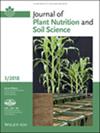Different responses of enzyme activities to 6-year warming after transplant of the 12 types of soils
Abstract
Background
Soil enzymes regulate terrestrial nutrient cycles, and their activities are sensitive to environmental change. Facing climate warming, there are still contradictions over soil enzymes of different soil types in response to climate warming.
Aims
The present study aims to reveal the impact of elevated temperature on soil properties. Specifically, we intended to explore the relationship between the activity of soil enzyme and soil property facing elevated temperature across soil types.
Methods
A long-term warming experiment was conducted to assess the possible responses of three enzymes (urease, phosphatase, and sucrase) to elevated temperature across 12 soil types. These soils were collected across China and transported to Nanjing in 2016. Free air temperature increase system with an infrared radiation heater was used to elevate the air temperature by 2°C in elevated treatment (eT). Wheat–soybean continuous rotation was cultivated in the long-term experiment field since 2016. Enzyme activities, soil pH, soil organic carbon, available nitrogen (AN) and phosphorus (AP), and water content were measured after wheat harvest in 2021.
Results
Warming significantly increased the activities of urease and sucrase in most soil types but dramatically decreased phosphatase activity. The responses of the three enzyme activities to warming varied across soil types, which depended on soil properties. In contrast, soil pH was the major driver in regulating urease activity. Soil AN and water content were two key factors for driving phosphatase activity. However, no such relationship was found for sucrase activity. All these responses did not show obvious regional characteristics.
Conclusion
These results suggested that soil enzyme was sensitive to air warming, which was associated with different soil properties. Thus, managing soil variables might be a potential strategy to maintain soil enzymatic activity in facing future climate warming.

 求助内容:
求助内容: 应助结果提醒方式:
应助结果提醒方式:


